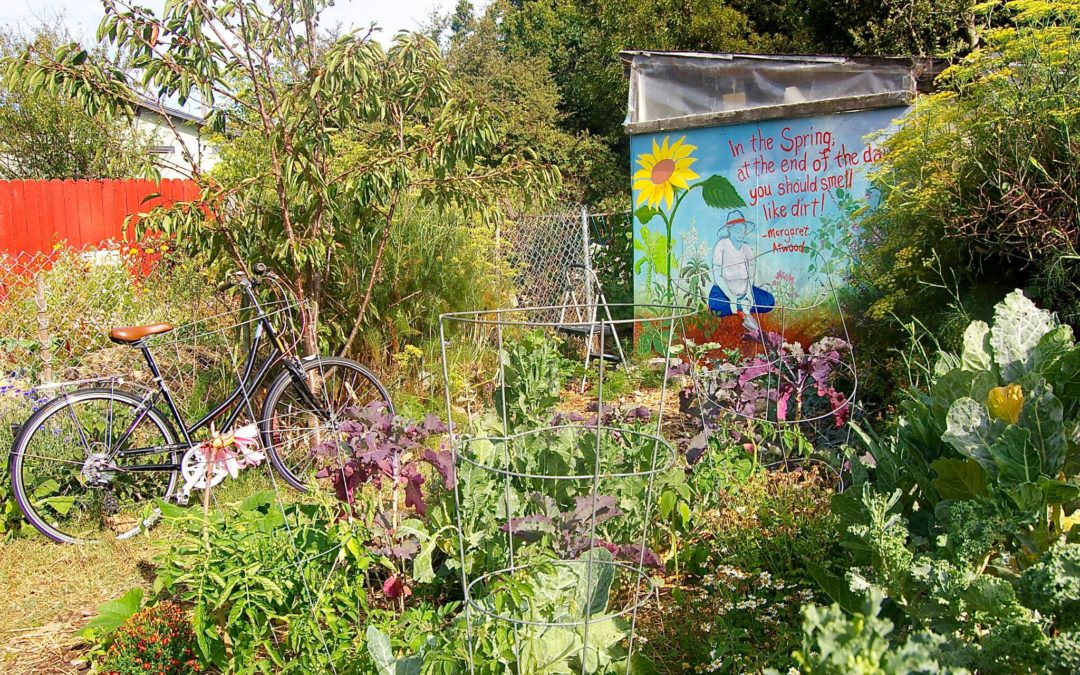This interview is part of an occasional series showcasing different inspirational community organizers who are part of the NorCal Resilience Network and organizing resilience hubs. Meet Bonnie Borucki and the Ashby Garden!
Ashby Garden, located in South Berkeley was founded in 2004. It started in an empty lot of the location and grew into a flourishing garden of many fruits, flowers, and vegetables. People here grow their own food and are independent of ongoing city programs. Volunteers also come by to help out with the garden and participate in community events. People also come together to share their knowledge of urban farming and grow food collectively.
NorCal Resilience intern Tracy Ngyuyen caught up with Bonnie to talk about this beautiful oasis and her role in it.
How did the garden begin? How has it grown and flourished?
We have a group of young people who are food activists and there were more vacant properties back then. They decided that this lot should be used for purposeful things for the community such as involving the community and growing food.
People who started the garden went to the books and asked who owned the land. We the flyered the neighborhood, had potlucks, community meetings, and eventually started classes and workshops. In the broader community, people have members and volunteers. We have garden members who pay for plots because it’s not financed. There are water bills, insurance. They grow whatever they like, grow and harvest, and share when they can. It’s a community space so it can be arranged for people to come and collect food. Or they can pick and distribute.
What does Ashby Garden hope to get out of the leadership training?
It’s difficult to stay with projects so trying to get people to commit is what we’re hoping. How do you commit and get other people to commit for a long time ya know? It’s also a lot of experimentation. Seeing other people can be incentives, and also going to a beautiful garden is another.
What are the short-term and long-term goals for the garden? Whom to you hope to impact?
Our long term goals are keeping the space, having it grow and thrive, and be part of the community. We’re hoping a land trust can help take it over. Our vision is to have a spot to build community by allowing people of many backgrounds to participate and contribute their best. Also we’re hoping for more community building overall.
The biggest impact would be to connect people with soil, plants, and support of other creatures. Water is also important and having an appreciation for these spots is also important.

What other kinds of projects are you working on in the community?
I am a co-director of Transition Berkeley, an organization that brings neighbors and community members together to build a more equitable, regenerative, self-reliant future for Berkeley. Projects we are working on include “Bee City Berkeley”, where we are planting pollinator gardens in Berkeley parks and public schools, and educating the public about the relationship between plants, pollinators, and our food. Another project is Essential Repair Skills Trainings, where we are bringing in repair experts in clothing, bike, appliance and electronics repair to teach these skills to high school and college students. A third project is Mobilize Berkeley. The group brings together UCB SERC students, environmental educators, faith-based communities, and other Berkeley residents to provide information on the state of climate change, ways to participate in a climate emergency mobilization, and preparation for the impact of climate change and other crises we are increasingly experiencing.”
Why is this work important so important to you?
“I’ve realized that the most important and satisfying work is to join with others in creating a society that lives in good relations to the earth and all the people and life forms that inhabit our planet. I recently heard a phrase that puts this work in perspective, “ When we have hope, we have life, and when we have life, we have hope”. To me this means that as long as we are living and thinking, we can make changes that will sustain a dignified, joyful life for future generations.”
.
